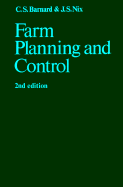Book contents
- Frontmatter
- Contents
- Notice to readers
- Preface to the first edition
- Preface to the second edition
- Selected metric conversion factors
- Part I The organisation of resources
- 1 The planning environment and the managerial function
- 2 Basic principles and concepts of planning
- 3 The organisation of capital – general
- 4 The organisation of capital – machinery, buildings and land
- 5 The organisation of labour
- Part II The organisation of enterprises
- Part III The combination of enterprises
- Part IV The control of resources and enterprises
- Selected further reading
- Index
2 - Basic principles and concepts of planning
Published online by Cambridge University Press: 01 June 2011
- Frontmatter
- Contents
- Notice to readers
- Preface to the first edition
- Preface to the second edition
- Selected metric conversion factors
- Part I The organisation of resources
- 1 The planning environment and the managerial function
- 2 Basic principles and concepts of planning
- 3 The organisation of capital – general
- 4 The organisation of capital – machinery, buildings and land
- 5 The organisation of labour
- Part II The organisation of enterprises
- Part III The combination of enterprises
- Part IV The control of resources and enterprises
- Selected further reading
- Index
Summary
Farmers often have little patience with economic principles and tend to dismiss them as theoretical ideas of little or no relevance to practical people. It is perfectly true that the considerable variations and uncertainty that occur in farming make it difficult to obtain precise data in order to provide neat answers for each individual farm situation. Nevertheless, knowledge of these principles is important to orderly thinking and thus to good decision-making. It helps the farmer or farm manager to realise what information he needs in order to make the decisions with which he is faced. It also helps narrow down the large number of alternatives between which a choice often lies. The principles are subconsciously used by successful farmers to a greater extent than they often realise.
The sequence of decisions in farm planning
The decisions that have to be taken in farm planning are no different fundamentally from those that need to be taken in manufacturing industry. They are covered by what is known in production economics as the 'theory of the firm'. Three basic questions have to be answered, the logical sequence of which would appear to be:
What to produce? That is, what enterprise, or combination of enterprises, should be chosen? To answer this question, 'product–product' relationships are studied.
[…]
- Type
- Chapter
- Information
- Farm Planning and Control , pp. 19 - 49Publisher: Cambridge University PressPrint publication year: 1980



